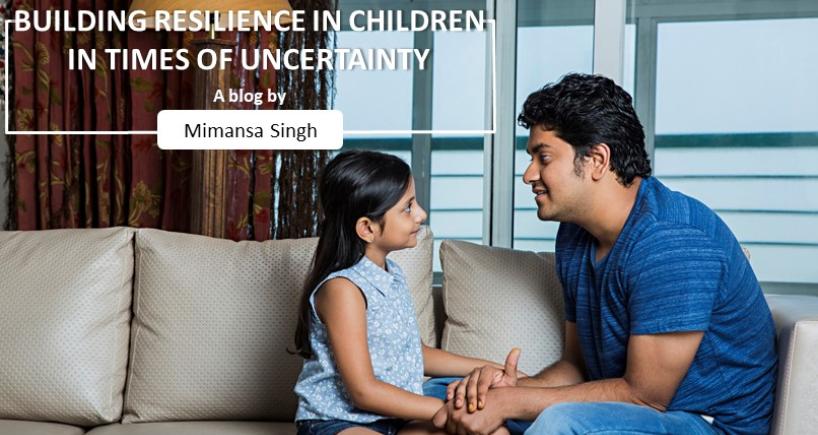
Mental Health and Behavioural Sciences
Building Resilience In Children In Times of Uncertainty
Building Resilience In Children In Times of Uncertainty Mar 23, 2020

On 12th March, we got an intimation from the school that they would be shut for 10 days, may extend till the spring break or perhaps even further.
On hearing this, my first grader started frolicking with joy. After an hour she enquired “For how long?” and I shared what the mail said.
She was too occupied with happy feelings that she didn’t really care.
A few hours later, she asked again “and when is it exactly, my school will open now?” I replied “well it is difficult to say it exactly when, but we may be looking at 10 days or even more”. I could sense that this uncertainty was triggering some thoughts of concern. Unlike school vacations and holidays which are pre-decided and absolutely certain about opening and closing dates, this was unusual.
This means not meeting friends, peers and teachers for not sure how long!
We all face uncertainties in our lives. What we are encountering at this very moment is a pandemic which has triggered a collective panic.
Not only has this epidemic induced feeling of collective vulnerability and fear, it has even made it difficult to ascertain with certainty how would this shape our lives in the near future at this moment.
We all need to acknowledge this as our communal reality at present.
Each time we face a challenge, we draw upon our resilience skills and support systems.
While the situation demands us to physically isolate ourselves, not only do we need to turn towards our inner strength to sail through this period, we also need to build upon a unified form of resilience. This is a unique time in the lives of our children, which we can optimistically use to instil resilience that is not only individualistic but that comes from a sense of inter-dependence and cohesiveness within family, friends, community and by exploring the power of being in the here and now. Sharing some tips on how can we utilize the experiences of current time to shape resilience in our children:
- Model emotional regulation: Given the situation, acknowledge your emotions of fear, panic and anxiety. It is natural to experience wave of emotions in uncertain situations. Yet it is important to not just let it expand. Engage in emotional regulation self-care practices like breathing, physical exercises that you can do at home, music, spend time, reading with nature or nurturing your greens at home. At the same time, stay away from unsourced news floating around as that can trigger emotions. Stick to the authentic sources and each time you feel vulnerable just ask yourself “What can I do to feel better?”. You are your child’s secure base. While you provide emotional security, encourage them to make journal, draw, paint, play more and write letters to their friends as a part of building their emotional resilience.
- Increase emotional connection: More quantitative time together can potentially lead to an increase in instructions or lectures. Though there will be frictions, be mindful of such reflexes. Make conscious effort to spend more time to listen to their stories and share yours during family time or over the table for a healthy emotional engagement. Pick up any topic to converse, show your curiosity to know more and let them indulge in theirs. Fostering closeness and warmth in relationships will enhance resilience.
- Find joy in day to day tasks: Household chores should not become a one person’s burden instead it is time for everyone to come together and share the responsibilities of household tasks. As parents, model equal participation and engage your children in tasks of their choice. While some of you may cringe at the thought of doing ‘homely tasks’, but these mundane activities like reassembling a cupboard, dusting the house all allow you to invest your energy and focus onto the task at hand. These are mindful in their own way as they bring order to the chaos in the house. Encourage children to engage in age appropriate similar tasks of their choice. It gives both a sense of purpose and the opportunity to experience joy in small mundane tasks.
- Maintain adaptable and problem-solving attitude: Avoid getting overly-stressed and anxious about ongoing and upcoming challenges. Take things as they come. Focus on things that are in your control and find a resolution to the problem at hand. It showcases adaptability to the situation by being aware, accepting and exercising control over things that you recognise you can. In tasks concerning your child, involve them in the process equally. “What do you think we can do here? You have any thoughts or ideas?”
- Set-in predictable expectations: A time when everyone is confined at home, the unstructured nature of the routine may seem difficult to manage. For smooth functioning of everyone’s needs, slowly pace into a routine. Create a similar structure around time and activities like it would be in your child’s school or your workplace or at home. Children respond well to predictability and consistency. Knowing clearly what to expect and what is expected of them, children feel a sense of security and comfort that makes them operate better. Alternate between structured and unstructured play and collaborate with their teachers or other parents for some online fun interactive sessions.
- Reach out to family and friends digitally: Stay connected with your family, friends and colleagues. Skype, whatsapp video or facetime, make use of your networking mediums. Encourage your children to also check on their friends. It is natural for them to also miss their routine at school, playing with their peers and friends and interaction with their teachers. Help them connect with their friends and classmates digitally or set up a call with the teacher they would like to interact with. It is time to make wise use of our digital world.
- Use this as teaching moment to share stories of Altruism: There many stories from the history that shows how communities thrive through altruism and collectiveness. Share similar stories that you know, from your experience, movies, documentaries or story books. Put that in the context with the current crisis share with them how it requires us to be responsible and compassionate. Talk about the importance of supporting and taking care of each other’s needs by practising rationing on our needs and following precautionary measures.
Let’s practice and nurture the ability to adapt, to connect and to live in the present with our children, as that is the resilience our children and we all need in uncertain times.



















